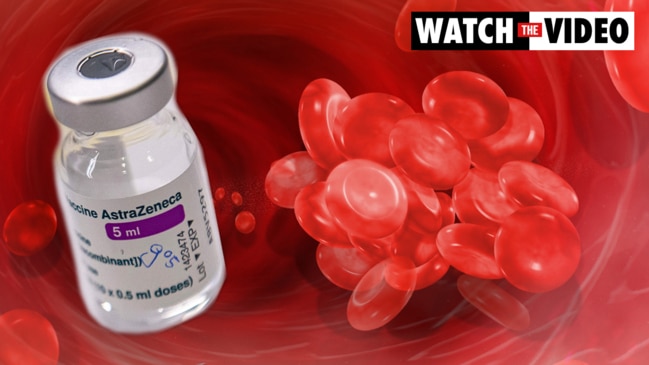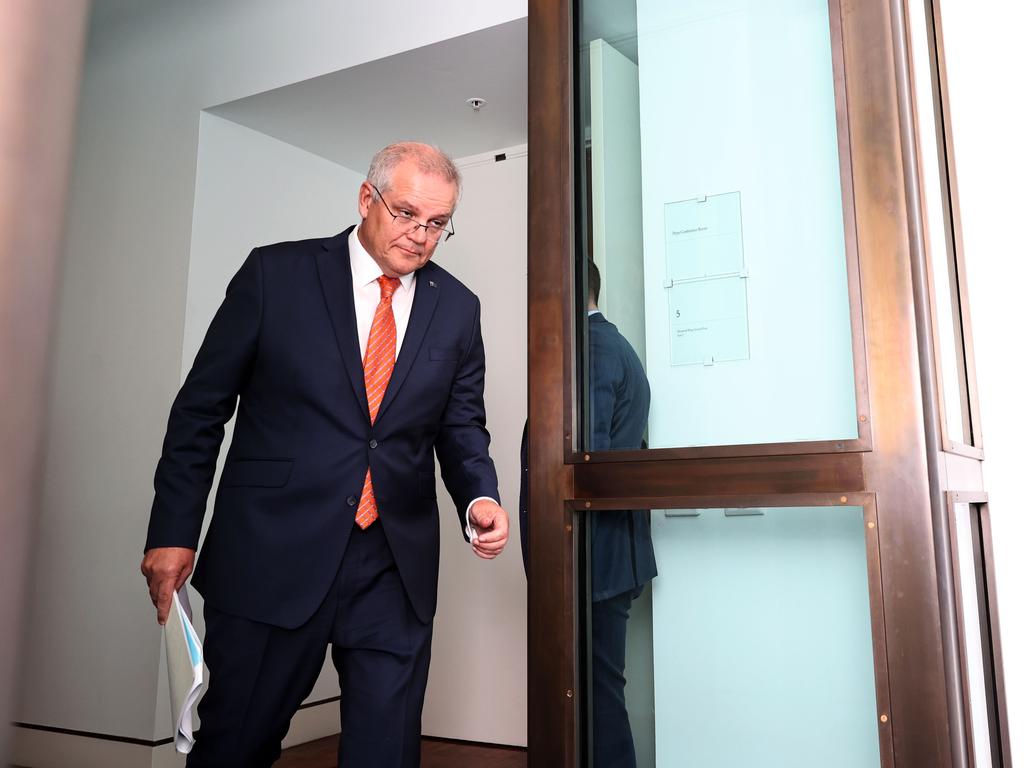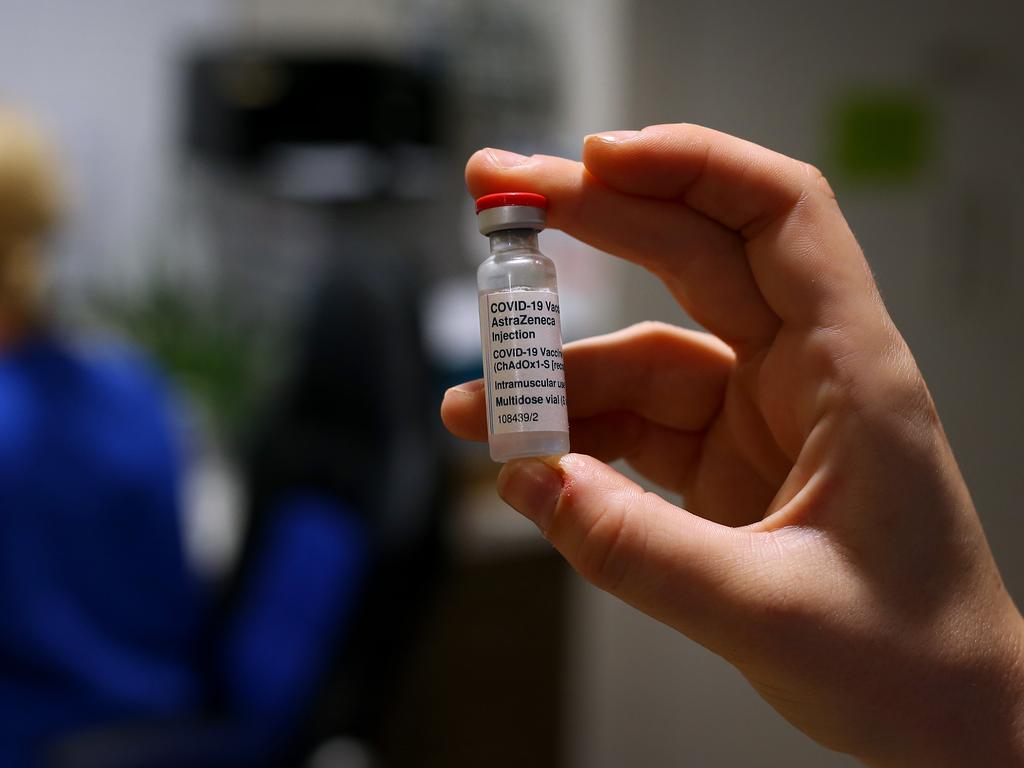Question PM can’t answer after ‘rare but serious risk’ leads AstraZeneca vaccine to be avoided for under 50s
Scott Morrison can no longer guarantee Australians will be vaccinated against COVID-19 by the end of the year. What does that mean?

Prime Minister Scott Morrison concedes he can no longer guarantee that every Australian adult will be vaccinated by the end of the year – a setback that could have huge implications for international border closures and the economy.
The fallout will take some time for the Morrison Government to work through after it was hit with new health advice on Thursday night to advise anyone under 50 to consider the alternative Pfizer vaccine – if it’s available.
One of the first impacts is likely to be a “recalibration” of not just the rollout timetable but Qantas’ hopes of reopened international borders from October 31.
RELATED: ‘Rare but serious risk’ leads vaccine to be avoided
RELATED: Australia reacts to drastic change to COVID-19 vaccine rollout

More than 5,000 words were uttered by the Prime Minister, his health minister and a top bureaucrat during a late night press conference on Thursday to announce the new advice on the AstraZeneca vaccine.
But in those thousands of words, the Prime Minister was at pains not to answer some big questions.
“In terms of what the overall implications are at this stage, it’s too early to give you that answer,’’ the Prime Minister said.
“I mean, this now has to be considered. The impacts assessed. And the program evaluated and recalibrated and, once we’ve done that, we’ll be in a better position to understand those implications.”

What will it mean for international border closures?
Again, the PM said it was too early to give a definitive answer.
“Well, I’ve already answered the first question on several occasions. I don’t propose to do that again,’’ the Prime Minister snapped towards the end of the press conference.
Asked if there was a rough timetable for everyone to be vaccinated, he cut off the question.
“No, we don’t. No, we don’t. We’ve learnt this evening, and I think we have to take the time to assess the implications for the program.
“When we’ve done that, we may be able to form a view. But I don’t think anyone should expect that any time soon. This will take some time to work through the implications.”
The good news is that compared to many other parts of the world we remain in one of the safest countries for COVID-19 transmission in the world.
Australians may be living in a ‘golden cage’ but unlike London or the US life is largely returning to normal.
“The fundamental protections we have in place in Australia at the moment with how we’ve been suppressing COVID have been very important, and Australians are living life here very different to how people are in other countries,’’ the PM said.
But there’s no doubt the government’s ultra cautious approach to the risks of the AstraZeneca vaccine could have huge implications for the economy.
As the PM himself argued earlier in the day there’s plenty of other medicines – including the contraceptive pill – that carry much higher blood clot risks.
So why argue against delivering a vaccine that experts say is safe and effective to under 50s? The simple explanation is that it comes down to a balancing of risks.
If the risk of death from COVID-19 is very low is it worth delivering a vaccine that carries the (rare) risk of a deadly blood clot?
Not everyone agrees with where the government has landed and experts stress the advice not to use the AZ vaccine on under 50s is not an order it’s simply the official advice.
You can still choose to have the vaccine if you wish to take an informed risk.
“The key principle of our management of the COVID-19 pandemic has always been to base our decisions on the expert medical advice,’’ the PM said.
“It has not been our practice to jump at shadows. It has not been our practice to take unnecessary precautions.”
The official advice now recommends the following: at the current time, the use of the Pfizer vaccine is preferred over the AstraZeneca vaccine in adults aged less than 50 years who have not already received a first dose of AstraZeneca vaccine.

The chief medical officer Paul Kelly said this is based both on the increased risk of complications from COVID-19 with increasing age, and thus increased benefit of the vaccination, and the potentially lower, but not zero risk, of this rare event with increasing age.
The second recommendation is that immunisation providers should only give a first dose of AstraZeneca COVID-19 vaccine to adults under 50 years of age where benefit clearly outweighs the risk for that individual’s circumstances.
The third recommendation is that people that have had their first dose of the COVID-19 AstraZeneca without any serious adverse events can safely be given their second dose.
This includes adults under the age of 50, and people who have had blood clots associated with low platelet levels after their first dose of COVID-19 AstraZeneca should not be given the second dose.
“What does this mean for the program? For Phase 1, which is vulnerable people, we will pretty much continue as we are,’’ Health Department secretary Brendan Murphy said.
“Those over 70 and 80 will continue to get AstraZeneca at their GPs and be confident in its efficacy and its safety. For those healthcare workers under 50, they will now be prioritised to Pfizer, and that might delay that particular phase of 1b. But that’s the only phase that might be delayed. The important thing is that all of the vulnerable people – those vulnerable to severe COVID – will be covered, as we planned, by the middle of the year.”
“Clearly, when we move into the broader, younger population later on, we will have to recalibrate by reprioritising some Pfizer for younger people, and we are now reviewing all of the vaccine purchases we’ve made.”
Australia is still expecting 51 million Novavax jabs later in the year and is looking at if it can bring other vaccines forward.
Pfizer has committed to 20 million doses this year which is enough to vaccinate 10 million people in two hits. But so far we’ve only got around 1 million doses.
To vaccinate everyone under 50 however the Morrison Government needs an estimated 12 million doses.
Health Minister Greg Hunt will not say when or where those Pfizer doses are coming from.
“We don’t identify, for security reasons, the specific source,’’ he said.
And with that, the PM, his health minister and the nation’s most senior health advisers exited the late night press conference to the sound of cameras flashing.
On Thursday night AstraZeneca said: “We respect the decision taken by the Australian Government based on advice from the Australian Technical Advisory Group on Immunisation (ATAGI) to recommend AstraZeneca’s COVID-19 vaccine be used in those over the age of 50.
“AstraZeneca has been actively collaborating with regulators and expert advisory groups around the world, including the TGA and ATAGI in Australia to understand the individual cases, epidemiology and possible mechanisms that could explain these extremely rare events.
“We note that the current situation in Australia with very low to no community transmission of COVID-19 was a factor in this updated recommendation from ATAGI and their view that the risk-versus-benefit assessment for the use of AstraZeneca COVID-19 vaccine may be different for Australia compared to other countries, such as those with widespread transmission.”




